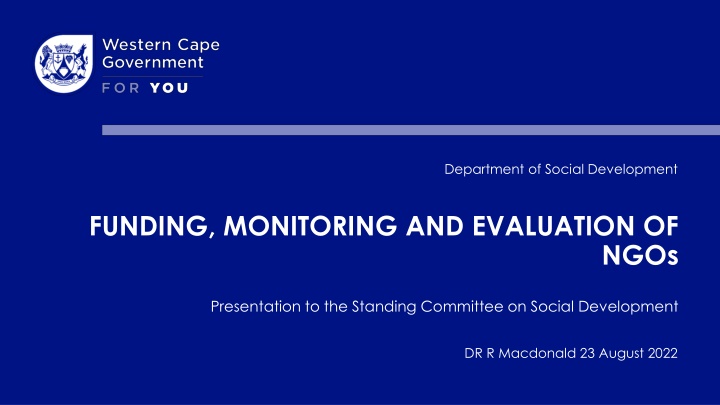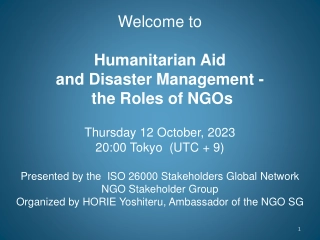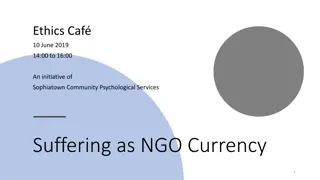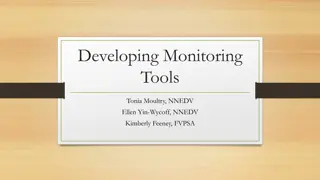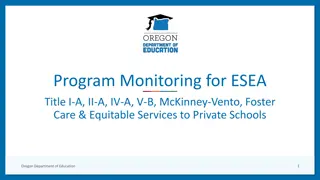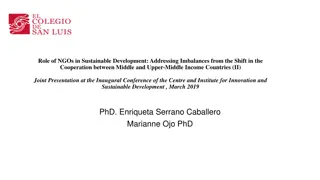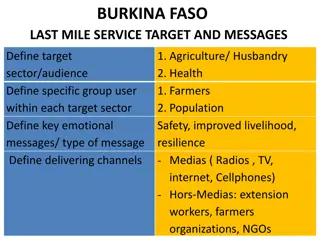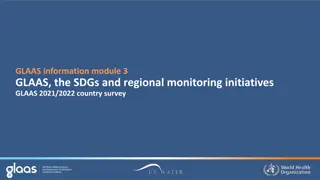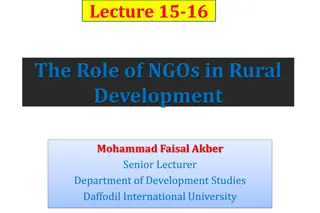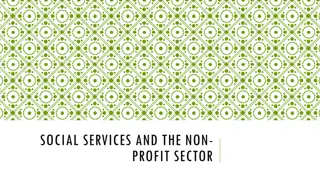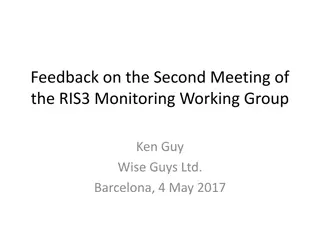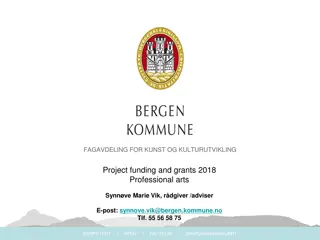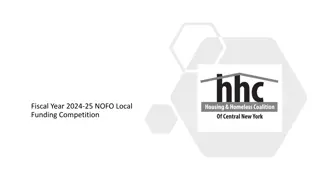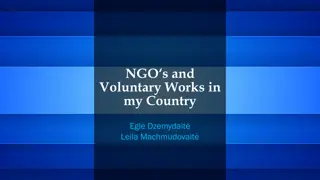Department of Social Development Funding and Monitoring of NGOs - Overview
The Department of Social Development in the Western Cape plays a significant role in funding and monitoring non-profit organizations (NPOs) to support social welfare and community development. In the 2021/22 financial year, over 2,000 NPOs received funding, though some were found to be non-compliant. The department's core principles include accountability, transparency, appropriate prioritization, and capacity building in allocating funds to NPOs.
Download Presentation

Please find below an Image/Link to download the presentation.
The content on the website is provided AS IS for your information and personal use only. It may not be sold, licensed, or shared on other websites without obtaining consent from the author.If you encounter any issues during the download, it is possible that the publisher has removed the file from their server.
You are allowed to download the files provided on this website for personal or commercial use, subject to the condition that they are used lawfully. All files are the property of their respective owners.
The content on the website is provided AS IS for your information and personal use only. It may not be sold, licensed, or shared on other websites without obtaining consent from the author.
E N D
Presentation Transcript
Department of Social Development FUNDING, MONITORING AND EVALUATION OF NGOs Presentation to the Standing Committee on Social Development DR R Macdonald 23 August 2022
Introduction Funding to Non-Profit Organisations represent a large part of the Western Cape Government and specifically the Department of Social Development s (DSD) budget. The Department contributes significantly to the lives of the poor and vulnerable in the Western Cape through this funding. In the 2021/22 financial year, a total of 2 040 NPOs received funding from the DSD in order to further policy objectives and priorities. 192 were found to be non- compliant. Funding of NPOs is implemented in accordance with the Department s Policy on the Funding of Non-Government Organisations for the Provision of Social Welfare and Community Development Services. DSD Funding, Monitoring and Evaluation of NPOs
Actual expenditure for 2021/22 financial year EXPENDITURE (R 000) PROGRAMME Care & Services to Families 100,620 Child & Youth Care Centres 108,658 Child Care & Protection 205,863 Crime Prevention & Support 14,428 ECD & Partial Care 375,571 Poverty Alleviation & Sustainable Livelihoods 45,332 Services to Older Persons 250,324 Services to Persons with Disabilities 165,825 Substance Abuse, Prevention & Rehabilitation 63,052 Victim Empowerment 62,057 Youth Development 14,974 1,406,704 Grand Total DSD Funding, Monitoring and Evaluation of NPOs
2022/23 Financial year allocations EXPENDITURE (R 000) PROGRAMME Care & Services to Families 99,473 Child & Youth Care Centres 111,658 Child Care & Protection 191,740 Crime Prevention & Support 13,002 After School Centres 15,384 Poverty Alleviation & Sustainable Livelihoods 55,668 Services to Older Persons 236,362 Services to Persons with Disabilities 154,500 Substance Abuse, Prevention & Rehabilitation 55,677 Victim Empowerment 62,866 Youth Development 14,171 1,010,501 Grand Total DSD Funding, Monitoring and Evaluation of NPOs
Core principles The Department allocates funding provided by a Vote of the Provincial Parliament to the NGO sector according to the following core principles: Accountability and Transparency: Public funds allocated for addressing social welfare and community development needs, will be utilised for its intended purpose in such a manner that it can be accounted for to the public and competent statutory bodies; Appropriate prioritisation: funds will be prioritised on the basis of the types of services based on departmental social and demographic trends analysis and needs assessment by the DSD; Capacity building: where appropriate, capacity building and support will be provided to small and emerging NGOs to render social welfare and community development services in order to develop local capacity, especially in non-metro and rural areas; DSD Funding, Monitoring and Evaluation of NPOs
Core principles cont. Efficiency and cost-effectiveness: A focus on results that meet the prioritised needs of citizens as reflected in the DSD s Annual Performance Plan, while making the best possible use of resources, and rewarding projects that perform well; Equity: The distribution of resources based on needs and priorities as determined by the mandates and medium-term objectives as defined in the DSD Annual Performance Plan and Strategic Plan. NGOs shall be given equitable access to bid for funding for social welfare and community development projects by adequate notification of funding availability through print media adverts and, in respect to currently funded NGOs, departmental circulars and through a fair process of assessment and allocation of funding on the basis of these core principles; Professionalism and best practice: Social welfare and community development services shall be rendered in a professional manner by staff of NGOs and the DSD; DSD Funding, Monitoring and Evaluation of NPOs
Core principles cont. Within the ethical framework and governing practices of professional councils such as the South African Council for Social Service Professionals; Within legislative requirements and norms and standards as prescribed e.g. by the Children Act, Older Persons Act, Child justice Act, Prevention and Treatment of Substance Act etc.; and In line with the internationally established best practices. DSD Funding, Monitoring and Evaluation of NPOs
Funding process of Social Welfare and Community Development Services DSD, within its available budgetary resources, funds the provision of statutory social welfare services and approved priority social welfare and community development services to achieve the progressive realisation of social services rights pertaining to children, older persons, and other vulnerable members of society as envisaged in the Constitution of the Republic of South Africa. Funding process is as follows: The funding process takes place within a 3-year funding cycle. Notification of the intent of DSD calling for proposals via advertising in the media and circulars. Business plans and application forms are submitted by NGOs which set out the main cost-drivers of each project/service output to one central point in DSD. Business plans submissions are recorded and then submitted to relevant programme managers. DSD Funding, Monitoring and Evaluation of NPOs
Funding process of Social Welfare and Community Development Services cont. Programme managers analyse and assess the business plans and application forms in terms of the DSD-approved eligibility funding criteria and predetermined specifications. Current funded organisations are also assessed on current performance. New organisations are assessed on their capacity and site visits conducted. Programme managers compile a schedule of all NGOs recommended for funding, and those who are not. The Funding Schedule is recommended by the relevant Chief Director and approved by the Social Development Head of Department. The Funding Schedule is noted by the Minister of Social Development. Successful and unsuccessful NGOs are notified of the outcomes. DSD Funding, Monitoring and Evaluation of NPOs
Funding criteria The Department s executive management approved the following criteria: (a) Track record of previous/current performance Evidence of a track record of previous performance can be obtained from either: - A sub-programme monitoring report for the previous financial year; and/or - A comprehensive monitoring compliance assessment and/or; - A desktop monitoring assessment for the previous financial year; and/or - A monitoring and evaluation rapid assessment report for the previous financial year; and/ or - Two quarterly reports for the previous financial year; and/or - An on-site monitoring and evaluation report that includes an assessment of service delivery implementation. Reports must either be certified by the appropriate programme director/ manager, or in the case of rapid assessments and on site monitoring and evaluation, by the monitoring officers as a true reflection of the status of the services delivered. It is contended that such a certified report provides evidence of a track record indicating that the NPO is competent and capable of rendering the service. DSD Funding, Monitoring and Evaluation of NPOs
Funding criteria cont. Quarterly submission of progress reports before funding can be activated during the year. These reports are an indication of the following: - Sound financial systems in place - Proper management structures and practices in place - Compliance in terms of previous funding criteria - Appropriate human resource practices - Trained staff - Income and expenditure - Evidence that clients/ beneficiaries received the services (b) Legislative compliance Verification by the Department that the NPO/Section 21/Trust registration of the residential facility, non- residential facility and/or social service organisation is valid. Verification by the relevant programme that the organization/services are legally registered in terms of any other service-specific related legislation, for example, the Children s Act, Older Person s Act etc. that requires such registration. DSD Funding, Monitoring and Evaluation of NPOs
Methods of funding for NGOs The following funding methods are used in respect of social welfare and community development services that are aligned to the DSD s Annual Performance Plan: Project or service outputs; The unit cost funding method will, where possible, be used for the funding of residential and non- residential services. Unit costs are reviewed annually, and funding level increases may be implemented as additional funding becomes available. (Unit costs apply to old age homes, CYCCs and shelters); The post funding method, where possible, be used to determine funding allocations. Post costs are reviewed annually, and funding level increases may be implemented as additional funding becomes available; (funded posts include social workers and administrative staff); and Funding may include seed funding for emerging organisations, pilot/new projects, funding for non- consumables such as furniture, equipment, accommodation and vehicle rental as required to render a specific programme or project. DSD Funding, Monitoring and Evaluation of NPOs
Monitoring (supervision) and assistance to NGOs DSD s line programmes monitor and assist the 1 142* funded NPOs per annum, or alternatively in a 3-year cycle, in terms of the relevant contract (Transfer Payment Agreement) legally entered between the NGO and the Department. Monitoring and Evaluation tools are being used by M&E officials and social workers such as: Desktop monitoring (annually) On site monitoring tool (3-year cycle) Quality assurance tool (2-year cycle for NPOs who receive more than R2million) Mentoring and Evaluation tool (3-year cycle) Rapid Assessment tool (annually and part of spot check) Financial Inspection tool (NPOs red flagged) Audit Financial Analysis tool (annually) * As at 31 July 2022. Reduction in number of NPOs due to the ECD function shift to WCED DSD Funding, Monitoring and Evaluation of NPOs
Monitoring (supervision) and assistance to NGOs cont. This entails the assessment of: Progress reports submitted by NGOs on a quarterly basis; Verification and validation of Non-Financial Data, for example, a register of beneficiaries of each NGO; Targets, outcomes and activities as prescribed in the contract; Income and expenditure per quarter; and Audited financial statements on an annual basis (September-December of a particular year); Line programmes conduct site visits and will entail: Financial and governance monitoring by Monitoring and Reporting officials; and Service delivery monitoring on norms and standards by registered social workers (in accordance with relevant legislation, such as Children s Act). DSD Funding, Monitoring and Evaluation of NPOs
Monitoring (supervision) and assistance to NGOs cont. Capacity building by line programmes for funded NPOs: If any non-compliance is identified, the line programmes will develop a Service improvement Delivery (SDIP) for NPOs in order to comply within 3 6-month period; Follow-ups done within a 6-month period to ensure that Service Delivery Improvement Plans are implemented in order to improve quality of service delivery by NPOs; and If needed, further capacity building and support to be provided by the Capacity Building Unit on issues of finance and governance management. DSD Funding, Monitoring and Evaluation of NPOs
Monitoring (supervision) and assistance to NGOs cont. Line programmes assist NPOs with the following: Registration of NPOs as old age homes, in-patient treatment centres, child and youth care centres and after school care facilities (funded and unfunded NPOs); Registration of service delivery programmes at CYCCs and diversion programmes etc.; Accurate completion of Non-Financial Data, progress reports and contracts; and Any new NPO who applies for funding will be assessed by line programmes and be guided in order to comply with legislative norms and standards. DSD Funding, Monitoring and Evaluation of NPOs
